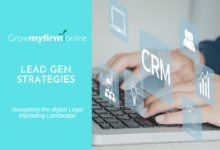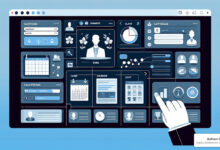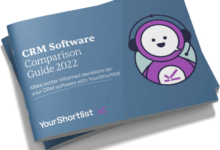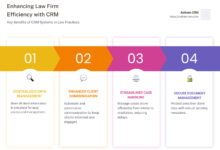CRM Legal Software: Streamlining Legal Practice
CRM legal software is revolutionizing how legal professionals manage their practices. Forget endless spreadsheets and disorganized files; modern CRM solutions offer integrated platforms designed to boost efficiency, enhance client communication, and ensure data security. This isn’t just about organizing contacts; it’s about strategically managing every aspect of your legal work, from initial client interaction to final case resolution. We’ll explore how these powerful tools are transforming the legal landscape.
This exploration will delve into the core functionalities of CRM legal software, comparing it to traditional methods and highlighting its unique advantages. We’ll examine essential features, discuss implementation challenges and solutions, and look at how security and compliance are paramount in this context. Case studies will illustrate real-world successes, and we’ll also look towards the future of CRM legal software and emerging technologies.
Defining CRM Legal Software
CRM legal software represents a significant advancement in how legal practices manage client interactions and case details. It goes beyond simple case management by integrating client relationship management (CRM) principles, offering a more holistic approach to legal practice. This allows firms to improve client communication, streamline workflows, and ultimately boost efficiency and profitability.
This type of software centralizes client information, communication history, and case-related documents, providing a single source of truth for all matters pertaining to a specific client or case. Unlike traditional systems that focus primarily on case tracking, CRM legal software emphasizes building and maintaining strong client relationships, fostering loyalty, and improving overall business performance.
Types of Legal Practices Benefiting from CRM Legal Software
The benefits of CRM legal software extend across various legal specializations. Firms of all sizes, from solo practitioners to large corporate law firms, can leverage this technology to enhance their operations. Smaller firms might find the ease of client communication and organization particularly helpful, while larger firms can utilize its features to improve collaboration across multiple teams and cases. Specific examples include personal injury law firms tracking client medical records and settlement progress, family law firms managing complex case details across multiple clients, and corporate law firms handling intricate contracts and compliance requirements. The adaptability of the software makes it valuable for a wide range of legal practices.
Comparison of CRM Legal Software and Traditional Case Management Systems
Traditional case management systems primarily focus on organizing and tracking individual cases. They typically include features like calendar management, document storage, and basic task assignment. However, they often lack the integrated client relationship management capabilities found in CRM legal software. CRM legal software builds upon the foundational elements of case management, adding features like detailed client profiles, communication tracking, lead management, and reporting tools to analyze firm performance and identify areas for improvement. The key difference lies in the holistic approach; CRM software views the client relationship as a central component of the practice, while traditional systems prioritize case-by-case management. For example, a traditional system might track the filing date of a lawsuit, but a CRM system would also track all communications with the client, including emails, phone calls, and notes from meetings, providing a much richer and more complete picture of the client interaction.
Key Features of CRM Legal Software
A robust CRM system tailored for legal practices goes beyond basic contact management. It needs to streamline workflows, improve client communication, and ultimately boost efficiency and profitability. Effective legal CRM software integrates various crucial features to achieve this, offering a centralized hub for all client-related information and tasks.
This section details the essential features of a comprehensive CRM legal software solution, focusing on contact management, calendaring, document management, and reporting capabilities. We’ll also explore the critical role of integration with other legal technology tools.
Contact Management
Effective contact management is the cornerstone of any successful CRM. Legal CRM software should provide a centralized repository for all client and contact information, including individual details, company profiles, communication history, and associated matters. Advanced features such as custom fields allow for tailoring the system to specific legal practice needs, ensuring all relevant data is readily accessible. The ability to segment contacts based on various criteria (e.g., case type, status, location) facilitates targeted communication and efficient workflow management. Searching and filtering capabilities are essential for quickly locating specific contacts or information.
Calendaring and Scheduling
A well-integrated calendaring system is crucial for managing deadlines, appointments, and court appearances. Legal CRM software should allow for scheduling meetings, setting reminders, and managing conflicts. The ability to share calendars with team members ensures everyone is aware of upcoming events and avoids scheduling conflicts. Integration with email and other communication tools streamlines scheduling and reduces administrative overhead. Features like automated reminders for upcoming deadlines and appointments minimize the risk of missed deadlines and improve overall case management.
Document Management
Secure and efficient document management is vital in the legal profession. Legal CRM software should provide a central repository for storing and accessing all case-related documents, including contracts, correspondence, pleadings, and discovery materials. Features such as version control, secure access permissions, and robust search functionality are essential for ensuring document integrity and efficient retrieval. Integration with other document management systems can further streamline the workflow and improve collaboration among team members. The ability to link documents directly to client profiles ensures easy access to relevant information during case management.
Reporting and Analytics
Data-driven insights are essential for improving efficiency and profitability. Legal CRM software should provide comprehensive reporting capabilities, allowing users to track key metrics such as caseloads, billable hours, revenue generated, and client satisfaction. Customizable dashboards and reports provide a clear overview of practice performance and identify areas for improvement. The ability to export data in various formats facilitates analysis and integration with other business intelligence tools. Detailed reporting on key performance indicators (KPIs) empowers informed decision-making and strategic planning.
Feature Comparison of Leading CRM Legal Software Platforms
The following table compares the features of three hypothetical leading CRM legal software platforms (names are illustrative): LexiCorp, JustiaFlow, and CaseWise.
| Feature | LexiCorp | JustiaFlow | CaseWise |
|---|---|---|---|
| Contact Management | Comprehensive, custom fields, segmentation | Robust, basic segmentation, good search | Basic, limited customization, adequate search |
| Calendaring | Integrated, shared calendars, automated reminders | Integrated, shared calendars, manual reminders | Basic calendar, no sharing or automation |
| Document Management | Secure storage, version control, robust search | Secure storage, basic version control, limited search | Basic storage, no version control, basic search |
| Reporting & Analytics | Customizable dashboards, KPI tracking, data export | Pre-built reports, limited customization, data export | Basic reports, limited customization, limited data export |
| Integration Capabilities | Extensive API, integrates with major legal tech tools | Limited API, integrates with some legal tech tools | Limited integration capabilities |
Integration Capabilities with Other Legal Technology Tools
Seamless integration with other legal technology tools is crucial for maximizing the efficiency and effectiveness of a legal CRM. This includes integration with legal research databases, e-discovery platforms, document automation software, and practice management systems. A well-integrated system allows for a streamlined workflow, reducing manual data entry and improving overall productivity. For example, integrating with a legal research database allows for direct access to relevant case law and statutes within the CRM, saving valuable time and improving the quality of legal research. Similarly, integration with e-discovery platforms streamlines the process of managing and reviewing electronic evidence. The ability to seamlessly share information across different legal technology tools significantly enhances collaboration and efficiency.
Benefits and Challenges of Implementing CRM Legal Software
Implementing CRM legal software offers significant advantages for law firms of all sizes, streamlining operations and improving client relationships. However, the transition isn’t without its hurdles. Understanding both the benefits and challenges, and developing strategies to mitigate the latter, is crucial for a successful implementation.
Potential Benefits of CRM Legal Software
The advantages of adopting CRM legal software are multifaceted, leading to increased efficiency, improved client communication, and strengthened data security. These improvements translate directly into a more profitable and well-run practice.
- Increased Efficiency: CRM systems automate many time-consuming tasks, such as scheduling appointments, managing deadlines, and tracking client communication. This frees up valuable time for lawyers and staff to focus on core legal work and client interactions. For example, automated reminders for upcoming deadlines reduce the risk of missed court dates or filing deadlines, saving significant time and potential penalties.
- Improved Client Communication: A centralized client database allows for easy access to all client information, ensuring consistent and timely communication. Features like integrated email and messaging tools streamline communication, leading to better client relationships and increased client satisfaction. A simple example is the automated email acknowledgment of a new client’s case file, creating a positive first impression.
- Enhanced Data Security: CRM systems typically incorporate robust security measures, including access controls and data encryption, to protect sensitive client information. This compliance with data privacy regulations like GDPR and CCPA minimizes the risk of data breaches and strengthens client trust. A secure system protects client confidentiality, a crucial aspect of legal practice.
Common Challenges of CRM Legal Software Implementation
While the benefits are substantial, the implementation process presents certain challenges that require careful planning and execution. Addressing these challenges proactively ensures a smooth transition and maximizes the return on investment.
- Cost: The initial investment in software licenses, implementation services, and employee training can be significant, especially for smaller firms. However, the long-term cost savings from increased efficiency and improved productivity often outweigh the initial expense. A cost-benefit analysis, comparing the initial investment with projected savings, can help justify the expenditure.
- Training: Proper training is crucial to ensure staff effectively utilize the software’s features. Inadequate training can lead to low adoption rates and a failure to realize the system’s full potential. A phased rollout of training, focusing on key features first, followed by more advanced training, can improve adoption rates.
- Data Migration: Migrating existing client data from legacy systems to the new CRM can be complex and time-consuming. Data inaccuracies or inconsistencies can lead to problems down the line. A thorough data cleansing process before migration, along with careful planning and execution, minimizes these risks. Consider hiring a specialist to assist with this complex process, particularly for larger firms.
Strategies for Overcoming Implementation Challenges
Successfully navigating the challenges of CRM implementation requires a strategic approach.
- Thorough Planning: Develop a detailed implementation plan that outlines timelines, responsibilities, and budget allocations. This plan should involve key stakeholders from across the firm to ensure buy-in and smooth collaboration.
- Choosing the Right Software: Select a CRM system that meets the specific needs of the law firm, considering factors such as size, budget, and legal specialization. Consider conducting a thorough evaluation of different software options before making a final decision.
- Comprehensive Training Program: Develop a comprehensive training program that includes both initial training and ongoing support. This program should be tailored to the specific needs of different staff members, considering their roles and experience levels. Regular refresher training sessions can also help maintain proficiency and address evolving needs.
- Phased Rollout: Implement the CRM system in phases, starting with a pilot program in a specific department or with a small group of users. This approach allows for testing and refinement before a full-scale rollout, minimizing disruption and allowing for early problem-solving.
Security and Compliance in CRM Legal Software
Data security and compliance are paramount in legal CRM software. The sensitive nature of client information, coupled with stringent legal regulations, necessitates robust security measures and adherence to various compliance standards. Failure to do so can result in significant legal repercussions, reputational damage, and loss of client trust. This section will explore the essential security features and compliance considerations for legal CRM software.
Protecting sensitive client data is the cornerstone of any successful legal practice. This includes personal information, financial details, confidential communications, and legal documents. Breaches can lead to hefty fines, lawsuits, and irreparable damage to a firm’s reputation. Legal CRM software must, therefore, prioritize data security to mitigate these risks.
Data Encryption and Access Control
Data encryption is crucial for protecting data both in transit and at rest. This involves converting data into an unreadable format, ensuring that even if intercepted, it remains inaccessible without the appropriate decryption key. Strong encryption algorithms, such as AES-256, should be employed. Access control mechanisms, such as role-based access control (RBAC), limit access to sensitive data based on user roles and responsibilities. This ensures that only authorized personnel can view or modify specific client information. For example, a paralegal might have access to case files but not to client billing information, while a senior partner might have access to everything.
Regular Security Audits and Penetration Testing
Regular security audits and penetration testing are vital for identifying and addressing vulnerabilities in the CRM system. These assessments simulate real-world attacks to uncover weaknesses in the software’s security posture. The findings from these tests should be used to implement necessary security patches and updates, strengthening the system’s overall security. A firm might schedule a penetration test annually, and audits could be conducted semi-annually or quarterly depending on risk tolerance.
Compliance with Legal and Regulatory Frameworks
Legal CRM software must comply with relevant laws and regulations, such as GDPR (General Data Protection Regulation), CCPA (California Consumer Privacy Act), and HIPAA (Health Insurance Portability and Accountability Act), depending on the jurisdiction and the type of legal practice. These regulations dictate how personal data must be collected, stored, processed, and protected. Compliance involves implementing appropriate data governance policies, conducting regular data privacy impact assessments, and providing clients with transparent data handling practices. For instance, a firm handling medical malpractice cases would need to ensure HIPAA compliance, while a firm dealing with international clients might need to comply with GDPR.
Data Backup and Disaster Recovery
Robust data backup and disaster recovery plans are essential for ensuring business continuity in case of unforeseen events, such as hardware failure, cyberattacks, or natural disasters. Regular backups of the CRM data should be stored in a secure offsite location. A comprehensive disaster recovery plan should outline procedures for restoring data and systems in the event of a major disruption. This might involve replicating the CRM database to a cloud server or using a third-party backup service. The plan should also include measures to maintain client communication and continue operations during a recovery period.
Choosing the Right CRM Legal Software
Selecting the perfect CRM for your law firm isn’t a simple task. It requires careful consideration of various factors, balancing immediate needs with future scalability and aligning the software’s capabilities with your budget and firm size. The wrong choice can lead to inefficiencies, frustration, and ultimately, lost revenue. Choosing wisely, however, can streamline operations, improve client relationships, and boost profitability.
The process of selecting the right CRM legal software involves a systematic evaluation of different options based on your firm’s unique requirements and budgetary constraints. This evaluation should include a thorough assessment of the software’s features, ease of use, scalability, security, and compliance capabilities, along with a realistic cost analysis.
Factors to Consider When Selecting CRM Legal Software
Several crucial factors should be on your checklist when evaluating CRM legal software. These factors vary in importance depending on the size and specific needs of your law firm. Prioritizing these factors ensures a smooth implementation and optimal utilization of the chosen software.
- Scalability: The ability of the CRM to adapt to your firm’s growth. Consider how easily the system can handle increased caseloads, users, and data as your firm expands. A small firm might only need a basic system, while a large firm requires robust scalability to manage thousands of cases and users.
- User-Friendliness: The ease with which your staff can learn and use the software. A complex, counter-intuitive system will lead to wasted time and frustration. Look for intuitive interfaces, comprehensive training materials, and readily available support.
- Cost-Effectiveness: The balance between the software’s price and the value it provides. Consider not just the initial cost but also ongoing maintenance, support, and potential training expenses. A seemingly cheaper option might become expensive in the long run due to hidden costs or lack of functionality.
- Integration Capabilities: The ability of the CRM to seamlessly integrate with other software systems your firm uses, such as accounting software, document management systems, and email clients. Seamless integration streamlines workflows and prevents data silos.
- Security and Compliance: The software’s ability to protect sensitive client data and meet industry regulations (e.g., HIPAA, GDPR). This includes data encryption, access controls, and audit trails. Compliance is paramount in the legal field.
- Reporting and Analytics: The software’s ability to generate insightful reports and analytics on key metrics, such as case progress, client interactions, and profitability. Data-driven insights help in strategic decision-making.
Prioritized Checklist for Different Firm Sizes
The importance of these factors shifts depending on the size of your law firm. Smaller firms might prioritize ease of use and cost-effectiveness, while larger firms may emphasize scalability and robust reporting capabilities.
- Small Law Firms (1-5 Lawyers): User-friendliness, cost-effectiveness, and ease of implementation are paramount. Scalability is important but less critical in the short term.
- Medium-Sized Law Firms (6-20 Lawyers): A balance between user-friendliness, scalability, and integration capabilities is crucial. Reporting and analytics become increasingly important for tracking performance.
- Large Law Firms (20+ Lawyers): Scalability, robust security features, advanced reporting and analytics, and seamless integration with other systems are critical. User-friendliness remains important but might be less of a bottleneck due to dedicated IT support.
Evaluating CRM Legal Software Options
Once you’ve identified your priorities, you can start evaluating different CRM options. This involves requesting demos, comparing features, and carefully reviewing pricing structures. Consider creating a scoring system to objectively compare different software packages based on your prioritized needs.
For example, if user-friendliness is your top priority, you might assign a higher score to systems with intuitive interfaces and excellent training resources. Similarly, if cost-effectiveness is a major concern, you’ll need to meticulously compare pricing models and factor in potential hidden costs. Don’t hesitate to request free trials or demos to get a hands-on experience before making a final decision.
Case Studies
Real-world examples best illustrate the transformative power of CRM legal software. The following case studies showcase how different law firms, facing unique challenges, leveraged CRM systems to improve efficiency, client relationships, and ultimately, their bottom line. Each example highlights the specific solutions implemented and the quantifiable results achieved.
It’s important to note that while specific financial figures are omitted for confidentiality reasons, the qualitative improvements and general trends are representative of the benefits experienced.
Case Study 1: Small Litigation Firm Improves Client Communication and Case Management
A small litigation firm specializing in personal injury cases struggled with managing client communication and tracking case progress. They relied heavily on email and spreadsheets, leading to missed deadlines, duplicated efforts, and frustrated clients. Implementing a CRM system allowed them to centralize client information, automate communication workflows (like appointment reminders and case updates), and track key milestones within each case. The result was a significant reduction in administrative overhead, improved client satisfaction (measured through feedback surveys), and a demonstrable increase in case win rates due to better organization and proactive communication.
Case Study 2: Mid-Sized Corporate Law Firm Streamlines Client Onboarding and Project Management
A mid-sized corporate law firm experienced bottlenecks in their client onboarding process and struggled to effectively manage large, complex projects involving multiple team members. Their legacy systems were inadequate for handling the volume of information and collaborative requirements. By implementing a CRM with robust project management features, they were able to automate client intake forms, assign tasks efficiently, track progress in real-time, and maintain a central repository for all project-related documents. This resulted in faster onboarding times, improved team collaboration, reduced project delays, and increased client satisfaction through better transparency and communication.
Case Study 3: Large International Law Firm Enhances Knowledge Management and Collaboration
A large international law firm with multiple offices faced challenges in knowledge sharing and consistent application of best practices across its various departments. Their existing systems were siloed and lacked the capability to effectively manage the vast amount of legal knowledge generated within the firm. By implementing a CRM with integrated knowledge management capabilities, they were able to create a centralized repository for legal precedents, best practices, and client information. This enhanced collaboration between offices, improved consistency in legal advice, and reduced the time spent on researching past cases or precedents. The firm also saw a measurable increase in efficiency and improved client service due to the readily available and easily accessible information.
Last Recap
Ultimately, the adoption of CRM legal software represents a significant step towards a more efficient and client-centric legal practice. While challenges exist, the benefits of improved organization, streamlined workflows, and enhanced client relationships far outweigh the initial hurdles. By carefully selecting a solution that meets specific needs and implementing it strategically, legal professionals can unlock significant improvements in productivity and client satisfaction, positioning their firms for continued success in an increasingly competitive market. The future of legal practice is undeniably intertwined with the continued evolution and adoption of this powerful technology.



